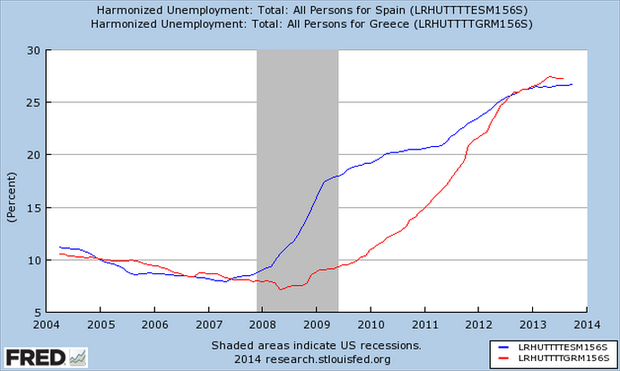The 3 things the IMF says are keeping Spanish unemployment so high
A new report released by the International Monetary Fund (IMF) this morning digs into the details on the labour markets in the Eurozone, and offers some new insights into Spain’s eye-watering unemployment levels

Spanish unemployment actually passed above Greek levels during parts of last year, despite a much less dramatic fall in output.
Greece is still contracting at a pace that would be regarded as severe for any other country, while the Spanish economy grew by 0.3 per cent in the fourth quarter.

Though some analysts question whether the Spanish unemployment rate can possibly be quite as high as official figures indicate, the fact that it is extremely elevated and well above most EU countries is not disputed.
The IMF says it’s down to three major factors:
Sticky or rising wages
As in many other countries during the crisis, wages did not fall in response to collapsing demand – but, many salaries in Spain were also indexed to outstrip the country’s historically above-average inflation. In 2008 and 2009, nominal wages rose by six and four per cent respectively.
Hours can’t adjust either
Sectoral and municipal agreements often mean that employers cannot adjust the hours given to employees in response to a demand shock. Combined with those rising wages, firms have laid off part time and temporary employees – unlike in other advanced economies, hours worked per employee have grown in Spain.

A two-track labour market
Spain has the largest share of workers on temporary contracts in the OECD, with far less serious costs for employers if they dismiss their staff on nonpermanent contracts.
BNP Paribas analyst Victor Echevarria adds that this is a particular concern for the country’s cripplingly high youth unemployment:
Out of those (young people) working, only 30% are on permanent contract, so most are either unemployed or trapped in a temporary job. Because of the low transition rate from temporary to permanent contracts, this trend is a concern, as it will be hard for this generation to acquire the skills it needs for high-productivity jobs eventually. Some estimates suggest that 40% of those entering the Spanish labour market currently on temporary contract will still be on temporary contract 20 years from now.